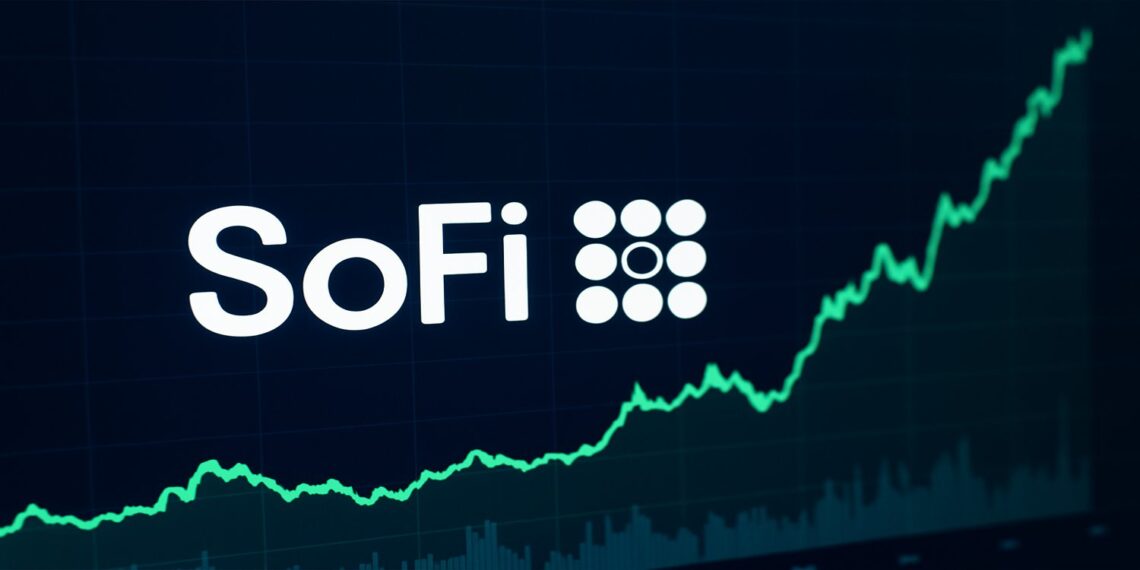The SoFi Technologies stock (NASDAQ: SOFI) has staged an impressive rally in recent weeks. After a period of consolidation earlier this year, the digital-finance powerhouse is back in the spotlight — powered by strong quarterly results, new product launches, and growing exposure to artificial intelligence (AI) and blockchain technologies.
At roughly $27.82 USD per share, SoFi is now one of the fastest-rising fintech names on Wall Street in 2025 — up more than 200 % year to date. Investors are asking the big question: can SoFi turn its diversified model into long-term, sustainable profitability?
Market Snapshot — October 7 2025
- Current price: $27.82 (+5.52 %)
- Intraday range: $26.55 – $28.80
- Opening: $27.08
- Volume: ≈ 86 million shares
- 52-week range: $8.16 – $30.30
- Market cap: ≈ $26–28 billion USD
The latest rally reflects renewed enthusiasm around SoFi’s expanding product suite and consistent operating performance. Although still volatile, the stock’s rebound from single-digit territory underscores how strongly the market now believes in the fintech’s growth narrative.
From Digital Lending to a Full-Scale Fintech Ecosystem
SoFi began as a student-loan refinancing platform but has evolved into a broad financial-services ecosystem combining banking, investing, and technology.
Today, SoFi’s platform includes:
- Lending & refinancing — student, personal, and auto loans
- Digital banking — checking, savings, and debit services under a federal charter
- Investing & brokerage — fractional stocks, ETFs, crypto, and IRAs
- Insurance, credit cards, and payments
- New product: Level 1 Options Trading — SoFi recently expanded into basic options strategies such as covered calls and cash-secured puts, with zero commissions and built-in educational tools for new traders.
Perhaps the boldest move is the announcement of the SoFi Agentic AI ETF (ticker: AGIQ) — a fund designed to give investors exposure to the next generation of “agentic AI” companies developing self-learning, autonomous technologies. The ETF strengthens SoFi’s position at the crossroads of fintech and AI investing.
By diversifying into asset management, brokerage, and next-gen tech exposure, SoFi is no longer just a lender — it’s building a platform economy, where growth comes from transaction fees, data insights, and recurring service income rather than interest spreads alone.
Financial Performance: Record Growth, Controlled Risk
SoFi’s latest quarterly report reaffirmed its status as one of the few fintechs achieving both scale and improving profitability.
Q2 2025 highlights:
- Net revenue: $855 million ( + year over year record )
- Net income: $97 million — a rare positive figure in SoFi’s history
- Members: continues to expand at double-digit rates
- Operating profit: positive for the seventh consecutive quarter
CEO Anthony Noto emphasized efficiency and diversified growth as key goals for the remainder of 2025.
Still, SoFi’s guidance for the next quarters was modest — a note of caution that some analysts interpreted as a sign of lingering macro uncertainty. Higher Treasury yields and market rotation out of growth names have added short-term pressure, yet the underlying trend remains constructive.
Catalysts Behind the Rally
1. Options Trading Expansion
SoFi’s entry into options trading has attracted a younger, active-trading demographic. The company offers fee-free basic options strategies with in-app tutorials — a move that directly challenges Robinhood and Webull.
2. The Agentic AI ETF
The new ETF positions SoFi as an early brand in the emerging agentic-AI theme. If successful, AGIQ could become a magnet for institutional flows and further cement SoFi’s reputation as an innovator in thematic investing.
3. Blockchain-Based Money Transfers
SoFi is testing blockchain infrastructure, partnering with Lightspark to enable cross-border transfers using stablecoin rails (USD → BTC → local currency). The pilot reflects its ambition to compete in international payments.
4. Consumer-Loan Securitization
A recent $525 million personal-loan securitization deal with PGIM demonstrated that capital markets still view SoFi’s credit book as robust. That confidence allows the firm to recycle capital efficiently for new loans.
5. Consistent Execution
With seven consecutive quarters of positive operating results, SoFi has proven its ability to scale without overextending — a feat few post-SPAC fintechs can claim.
Competitive Positioning and Industry Context
The fintech sector in 2025 remains a story of consolidation. Traditional banks like JPMorgan and Citi are integrating digital features at record speed, while newer entrants — Robinhood, Revolut, Nubank — target retail growth through low fees and gamified investing.
SoFi’s key differentiator is vertical integration: it owns a bank charter, operates a tech platform, and controls its customer acquisition funnel end-to-end. That gives it cost advantages and tighter regulatory control compared with peers that rely on partner banks.
Its main challenges are scale and efficiency. Competing simultaneously across lending, investing, and asset management requires heavy investment, which can pressure margins in tougher macro cycles.
Risks to Watch
- Valuation Risk
Some analysts warn that the stock’s rally has run ahead of fundamentals. Early 2025 downgrades (e.g., KBW to “Underperform,” price target $8) reflected those concerns — though the company has since delivered far stronger results. - Interest-Rate Environment
Rising yields hurt growth-stock valuations and may dampen demand for refinancing products, a key revenue driver for SoFi. - Execution Complexity
Managing multiple growth tracks — banking, brokerage, asset management, crypto, and AI — raises operational risk. Integration delays could slow momentum. - Competition Pressure
Large brokers (Charles Schwab, Fidelity, Robinhood) continue to launch similar zero-fee products. Customer loyalty in fintech is notoriously fickle. - Regulatory Uncertainty
Data-privacy laws and crypto oversight may tighten. SoFi’s exposure to both digital assets and AI makes compliance crucial.
Market Scenarios 2025 – 2027
Bull Case ($40 +)
SoFi executes flawlessly: options trading and AI ETF gain traction, blockchain payments scale, and revenue diversification drives sustained profitability. Investors reward it with premium valuation multiples.
Base Case ($25 – $35)
Growth moderates but remains steady. The stock trades within a consolidation range as investors wait for consistent earnings and broader ETF adoption.
Bear Case ($15 – $20)
Macro headwinds return; rates stay high and consumer credit weakens. Growth slows, valuation compresses, and risk appetite fades.
Investor Outlook and Strategy
SoFi has reached a critical stage in its transformation from niche lender to mainstream financial-platform brand. For investors, that means both opportunity and execution risk.
- Use staged entries: Build positions gradually during pullbacks rather than chasing rallies.
- Focus on metrics: Track revenue mix, fee-based income, and net-interest margin.
- Risk-manage: High volatility makes stop-loss discipline essential.
- Stay long-term: Hold only if you believe in multi-year profitability expansion.
SoFi is not a conservative core holding — it’s a calculated bet on the evolution of digital finance.
The Bigger Picture: Fintech Reinvention
What sets SoFi apart in 2025 is its ability to blend traditional banking stability with cutting-edge tech narratives. Few companies manage to combine regulated banking operations with exposure to AI, ETFs, and blockchain innovation under one roof.
If SoFi can keep balancing compliance with creativity, it could become the blueprint for next-generation hybrid financial institutions.
The brand’s youthful appeal, product diversity, and strong mobile ecosystem position it well for global expansion — especially if macro conditions turn more supportive in 2026.
Conclusion: High Growth, High Expectations
The SoFi Technologies stock embodies the optimism — and the volatility — of modern fintech. Its rise above $27 marks a new chapter in the company’s story: from student-loan disrupter to diversified digital-finance platform.
Execution remains the key variable. As long as SoFi continues to deliver profitable quarters and maintain product innovation, the rally could have legs. But with valuation stretched and competition fierce, investors must stay selective and risk-aware.
For aggressive growth investors, SoFi offers exposure to multiple financial frontiers — banking, AI, and blockchain — within a single name. For conservative portfolios, it’s best viewed as a long-term speculative growth play rather than a defensive holding.
FAQ — SoFi Technologies Stock
Why is SoFi stock rising?
Strong quarterly earnings, product expansion (options, AI ETF), and improving profitability have boosted investor confidence.
Is SoFi profitable now?
Yes — the company reported positive net income of $97 million in Q2 2025, its seventh straight profitable quarter.
What’s next for SoFi?
Launch of its Agentic AI ETF, further blockchain integrations, and steady banking growth.
Is SoFi overvalued?
At ≈ $28 per share, valuation is rich relative to current earnings, but justified if double-digit growth continues.
Should I buy SoFi stock?
Consider it only if you can handle volatility and are focused on long-term fintech exposure.
Disclaimer
This article is for informational and educational purposes only and does not constitute financial advice or investment recommendations.
All opinions reflect the author’s view at the time of publication. Investing in equities such as SoFi Technologies stock involves substantial risk, including the potential loss of capital. Readers should conduct independent research or seek guidance from a licensed financial advisor before investing.








